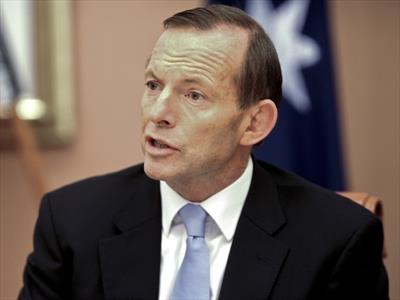PRIME Minister Tony Abbott says he remains committed to “stopping the boats”, but appears to be wavering on key points in the asylum-seeker policy he took to the election.
Speaking in Jakarta on Tuesday, Mr Abbott said he believed a stronger bilateral framework for dealing with asylum seekers, under the regional people-smuggling dialogue known as the Bali Process, would arise from his discussions with the Indonesian president.
A day after his critical meeting with President Susilo Bambang Yudhoyono, which came in the wake of rising tensions between Canberra and Jakarta over the people-smuggling issue, Mr Abbott said “everything was on the table” during the talks.
“I made it very clear that this is an issue of sovereignty for us and I think I can say that on the Indonesian side, there was a willingness to be as co-operative as was possible to ensure this evil scourge is ended,” Mr Abbott said.
“We are 100 per cent committed to stopping the boats, we are 100 per cent committed to the policies that we took to the election and the policies that are necessary to stop the boats.”
But the prime minister on Tuesday also twice refused to say whether the turn-back plan would actually be implemented, while also appearing to step back from two other controversial elements of his asylum-seeker policy.
Asked directly whether he would turn boats back, Mr Abbott said: “Again, my object here is to stop the boats and in order to ensure the boats are stopped, I want to have the best possible relationship with Indonesia.
“I’m just not going to engage in the kind of press banter that is not going to be conducive to what is in our overall national interests, Australia’s and Indonesia’s, to get these boats stopped.”
Two other controversial measures in the coalition’s border protection regime – buying boats from Indonesian fishermen to prevent them being used by people smugglers and bounty payments to villagers who inform on smuggling operations – now appear unlikely to be implemented.
Mr Abbott said the millions of dollars set aside for the two measures would remain available, but it was up to the Indonesian government whether the funds would be used.
Both measures have been slammed in Jakarta as recently as this week, with a senior adviser to the Indonesian vice-president saying they would do nothing to halt the flow of asylum seekers.
“I doubt very much that Indonesia would approve any other country spying on Indonesia, regardless what the purpose would be,” Dewi Fortuna Anwar told the ABC.
“If you buy those leaky boats, then the fisherman will have money to buy more boats,” she said.
Mr Abbott had wanted the visit to be about more than “stopping the boats” and on Tuesday, addressed a gathering of business and political leaders about the need to boost trade and investment between Australia and Indonesia.
The breakfast meeting was attended by a number of high-profile Indonesian ministers, including Trade Minister Gita Wirjawan, Finance Minister Chatib Basri and Agricultural Minister Suswono.
Mr Abbott vowed to rebuild confidence between Australian and Indonesian businesses, lamenting that a “mature” economic relationship has not yet been reached.
Shock decisions such as the temporary ban on live cattle exports to Indonesia by the former Labor government were a thing of the past, even if it will take time to repair the damage, he said.
“The new Australian government is determined to put this episode behind us,” he said.
Mr Abbott also expressed a desire to expand bilateral trade, noting Australia’s two-way trade with New Zealand outstripped that with its northern neighbour.
He rehashed his government’s new Colombo Plan, which aims to boost the number of Australian students studying in Indonesia, and said he wanted the focus of language education in schools to be on Asia.
But the bottom line was there was a new government in town and it was open for business.
“The new government’s approach is very straightforward: we will take a respectful, consultative, no-surprises approach to relations with Indonesia,” Mr Abbott said.
“Our aim is to rebuild confidence so that both sides respect each other and trust each other to keep commitments.” – AAP












